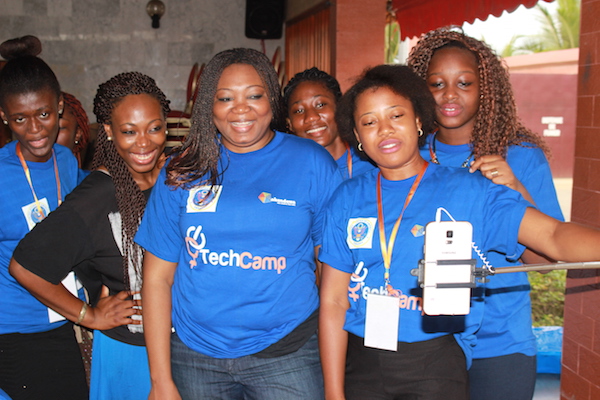
Ahead of the Transform Africa Summit in Kigali, Nnenna Nwakanma, the Web Foundation’s Africa Regional Coordinator, shares with us some reasons to be cheerful, and reasons to worry, over Africa’s digital future.
Last weekend, I stood in the pouring rain and helped to disappoint hundreds of youngsters. An Innovation Weekend had been organised by a pan-African agency at its headquarters in Abidjan, Côte d’Ivoire. There were fewer than 200 spaces available, but more than 1,000 young people registered — and over half of them showed up. A young man paid for a flight ticket from Burkina Faso for himself and was not able to get in to the event.
I wasn’t personally involved in running the event, but I’d helped to spread the word, and I know the organisers. So I volunteered to go outside to help make apologies. “There are not enough spaces for everybody. We are sorry,” I said over and over again, in English and French. “We’ll share as much information as we can on the website and on Twitter.”
On the one hand, this is a story of hope. That so many youngsters would give up their weekend to get to engage with technology and innovation gives me heart. But on the other hand, this is a wake up call that we are failing those who want to use the Web to improve their lives. As Africans, we don’t yet operate at the highest level of technical skills. Our Internet is too expensive. We’re denying our poor, our women, our rural dwellers access. So as our leaders prepare to gather in Kigali this week, I want to ask — what must we really do to Transform Africa?
We need to get the technology right
On the eve of the Technology Weekend, an announcement had gone out asking participants to get ready to engage on social media. A respected Internet Service Provider was to flood the event with broadband connectivity. Unfortunately, the connection was patchy, failing throughout most of the conference. Since I had promised those who could not get in to the event that we would relay as much information as possible across different technology platforms, I felt personally responsible for this failure.
This pattern is repeated week in, week out— at conferences, at homes, in offices. We need reliable infrastructure and skilled technicians to ensure that service failures are the exception, not the rule.
We need to stop kidding ourselves — costs are still too high
Nowhere is this rhetoric more pronounced than in the smartphone landscape. Ideas like “anyone with a $40 mobile phone and a nearby cell tower can get online with ease” and “sub-$50 no-contract smartphones are already a reality today” are on the increase.
Since I have not seen many of these, I asked people on Facebook and Twitter to tell me the cost of their phones and inform me of the cheap options easily accessible across Africa.

I am yet to get an answer that is $40 or below. Where are the cheap smartphones? Who is producing them? Who is using them? I see that Itel and VMK are gently coming our way but no, they are not yet mainstream.
The final cost of devices is influenced by many factors — one of them government taxes. The government of Côte d’Ivoire made an historic move earlier this year when it slashed taxes on mobile phones, bringing them down from 27% to 6.6%. It’s time for more governments to take a rounded, long-term view of the relationship between tax revenues and and socio-economic progress. Devices that allow people to connect to the Internet should no longer be seen as luxury goods.
Patent royalties add to the price people pay too. Did you know that patent royalties can be the bulk of the cost of the phone in your hand? If we’re serious about transforming Africa, maybe it’s time to look for new, open source models for our technology.
We need to ensure some groups aren’t left behind
The 15th of October was the International Day of Rural Women. This reminded me of some of the findings of A4AI’s 2014 Affordability Report, which show that women and those living in rural areas are often unable to secure affordable access to the Internet for two primary reasons. The first is that incomes tend to be lower for women and in rural areas, resulting in a higher real cost to connect. The second is that challenges associated with infrastructure deployment in rural areas result in limited opportunities for access — particularly under current regulatory environments — or in access prices that are significantly more expensive than those in urban areas.
For those of us heading to Kigali, let’s ask our leaders to wake up
Rwanda: bold, young, accessible, rural, and gender conscious
Today, I am heading to Rwanda, to the Transform Africa Summit. For me, Rwanda brings my issues together. It is a country of young people that has made strides in deploying Internet access to its population, a population that is largely rural. It has also made strides in effectively increasing equal opportunities to men and women. This year, it will launch its Silicon Valley Innovation Initiative.
Unfortunately there is only one Rwanda. Where are the other 53?
- When are we going to wake up to the call of the youth – the ones who will stand in the pouring rain for hours just to attend a seminar on online innovation?
- When are we going to wake up to the lack of political will to put in place innovative policies that can make affordable broadband Internet connectivity for all Africans a reality?
- When are we going to wake up to the high cost of devices?
- When are we going to wake up to the inequality that is keeping women far from the knowledge economy?
- When are we going to factor in the rural dweller?
Why not today?
If you’d like to connect with the Web Foundation and A4AI team members that will be in Kigali, please follow us on @webfoundation and @a4a_internet.
Comments are closed.
